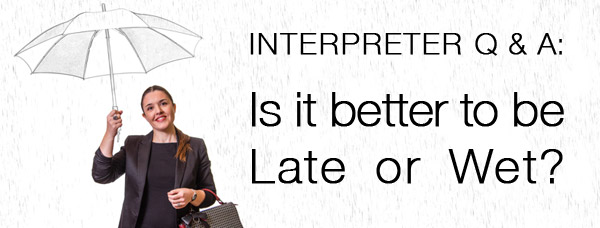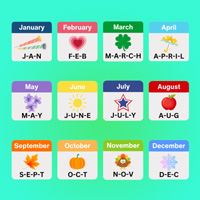
Interpreter Q & A: Is It Better to Be Late or Wet?
This article is part of our "Dear BC, Interpreter Q & A” series, which answers questions on interpreting and Deaf culture from multiple perspectives. There isn’t always one “right” answer to every question, and different people have different opinions on how to handle different scenarios. That is why more than one perspective is provided in this series, however, more opinions always exist. These perspectives are gathered from talking with experienced interpreters and deaf consumers from across the United States and Canada and do not solely come from the author.
Which is better in your opinion — to be a few minutes late for an interpreting job when it is pouring rain or to show up on time, but soaking wet?
Thanks,
Hoping Not To Be Late & Wet
An Experienced Interpreter's Perspective:
If you arrive late (but dry) the consumers may be inconvenienced, annoyed, frustrated, anxious, etc. However, an appropriate business-like explanation/apology should soon set this matter aside and allow everyone to concentrate on the business at hand.
I suspect the consequences will be more serious if you arrive drenched, but on time. Although you are “on time” by the clock, you may not be ready to do the job. At least from my experience, it is difficult to concentrate on the interpreting task while dressed in uncomfortable, wet, clingy clothing and sodden shoes. Those are not conditions conducive to producing your best work. Secondly, imagine the effect on consumers as they try to concentrate on the business at hand and their communication goals, while trying to ignore the squishing sounds as you move around, the fine mist spraying off your fingertips, and the ever widening puddle on the floor beneath you (and these distractions will continue for the duration of the assignment!).
After the assignment is the appropriate time to consider what reasonable alternatives might have prevented your dilemma. You might want to stop by a store on the way home and purchase appropriate rain gear and an umbrella to keep in your car and/or interpreter’s tote.
Experienced Deaf Consumer's Perspective:
Interpreters must make judicious safety-related decisions.
If the interpreter is on a college campus, he or she can wait for a few minutes until the pouring rain has subsided, even though they should have an umbrella. As soon as you get to the classroom you can privately tell the Deaf student(s) succinctly the reason for being late.
If it is to interpret for a doctor’s appointment or a lawyer meeting, it would be best for the interpreter to call and let the parties know that you will be a little late due to the heavy downpour.
In other words, it is wise to be late for an appointment as long as the parties involved (both hearing and Deaf) know that you are on the way. Coming into the appointment soaking wet may not only reflect badly on the interpreter, but it may also reflect badly on the Deaf consumer. Again, the interpreter’s safety is the key to making sure that the communication process will work, no matter how late the interpreter arrives to the appointment.
ADVERTISEMENTS
 Brenda Cartwright is a Coda, seasoned interpreter, a master teacher, well known presenter, and author of several best selling sign language and interpreting textbooks from the RID Press. For 35 years Brenda was the Chair of the Sign Language Interpreter Program at Lansing Community College in Lansing, Michigan.
Brenda Cartwright is a Coda, seasoned interpreter, a master teacher, well known presenter, and author of several best selling sign language and interpreting textbooks from the RID Press. For 35 years Brenda was the Chair of the Sign Language Interpreter Program at Lansing Community College in Lansing, Michigan. Interpreter 4-1-1: Top 10 Pearls of Wisdom for Interpreters
Interpreter 4-1-1: Top 10 Pearls of Wisdom for Interpreters Interpreter Q & A: Interpreter Credentials
Interpreter Q & A: Interpreter Credentials Signs That Are Close... But Not the Same - Set 1
Signs That Are Close... But Not the Same - Set 1







